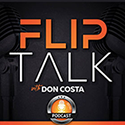Are you tired of chasing dead ends, throwing money at marketing that doesn’t deliver, and wondering where your next deal will come from? In real estate, leads are the lifeblood of your business, but not all leads are created equal. And knowing how to make them work for you? That’s the real game-changer. Join us on Flip Talk today as we dive deep with Andy Kolodgie, the mastermind behind Property Leads. Andy pulls back the curtain on a strategy that could revolutionize how you acquire motivated sellers, control your budget, and finally get the deal flow you’ve been dreaming of.
—
Listen to the podcast here
Maximizing Real Estate Leads: The Pay-Per-Lead Blueprint With Andy Kolodgie
I have some exciting stuff to talk about. Leads are something that we all need more of in our business, and making those leads work is very important. Before we get into that, I want to make sure that we are sending you over to FlipTalk.com. We have everything going on in the FlipTalk universe, from previous episodes and new and upcoming episodes. We have some amazing free giveaways there. As always, you can also look into becoming part of one of our communities on FlipTalk.com. I have Andy Kolodgie. How are you doing?
I’m doing great. How are you?
I’m doing good. I’m looking forward to this conversation. We had a pre-show conversation. I hate it when we do that because we start dropping some good stuff, and I’m afraid we’re not going to get on the show. We’re going to talk about leads, lead types, and some of the things that we can do in our business to make leads more effective. Let’s talk about why you’re even in this space. What got you into the real estate investing space in the first place?
I was a software engineer for the Navy for about three years. I had a classic W-2 job. I faced the government’s union at some point. I had that experience, and I didn’t like that. I didn’t like that I was going to hustle and grind through my success in the government, which is never understandable. I got into the whole rental game at first. I got a house. There were four in there, including me at that time. We had a house with four bedrooms, which is pretty wild.
I started to realize that to get a good deal, you have to do direct-to-seller. I tried cold calling and cold texting. I was a mess at that kind of stuff. Eventually, I stumbled into SEO. That’s where our real history started getting put together. We had success with SEO. Our first site up, we were generating 60 leads a month. It was that after another. We had partnerships and eventually rounded them all up into a company known as Property Leads, which is what I do now.
You are all things lead. We had you on an episode talking about SEO, but in this episode, we’re going to talk about pay-per-lead. Let’s get into a couple of things. One of the things is, what exactly is pay-per-lead?
Understanding What Pay-Per-Lead (PPL) Is & Its Advantages
There are other companies in the space, too. I don’t want this to turn into a pitch about Property Leads specifically, but Property Leads does this. Other companies do it, too, where they’re going to take on all the brunt of the marketing stuff. They’re going to take on all the risk and the cost of stuff like that. We spend $1.5 million a month on pure marketing, not even including the cost of SEO. It’s pure dollars and cents going out to big boys and stuff.
We’re taking on all the risk. You guys are going to be buying the leads at a price that you determine for your business to be able to buy leads. Let’s say you’re in Birmingham, Alabama, and the price per lead is $200,000, but you can only pay $175,000. You lock your price in at $175,000 because you know that’s how your business works. When leads start to hit the $175,000 price point, you start getting leads, you can start doing deals, and stuff like that. You control your geography. It’s entirely self-service. It’s very easy to turn on and off compared to other market channels like direct mail.
That’s one of the things. One of the advantages of pay-per-lead is that you can set your budget. You can also pause it. You can turn it on and turn it off. It’s not one of those things where you’re constantly dumping money into unless you’ve got 1,000 things going on that’s working well. If you need to take a break or you need to catch up with your leads, you can pause it for a second. You’re not going to lose that momentum is the point.
We see this in direct mail. You do mail dropping, and you might not get all the calls you need. By the 9th or 10th mail drop is where stuff starts happening. You don’t have that same risk with pay-per-lead. The leads are there or they’re not there, but they’re always available. We’re taking all the risk. You could save your entire budget. When you get that flip and you have to push all money into it because your tenant started squatting and you have to start chipping away your bills, there’s no issue with turning on pay-per-lead for that time period.
Google today is heavily built on machine learning, so you need a larger budget to generate enough conversion data to make informed decisions. Share on XDistinguishing Pay-Per-Lead (PPL) From Pay-Per-Click (PPC) & Identifying Red Flags In PPL Companies
What’s the difference between pay-per-lead and PPC? For the people who don’t know, PPC is Pay-Per-Click, basically Google AdWords. What’s the difference between pay-per-lead and PPC in your eyes?
You are going farther up. You have the pay-per-click providers, such as Google Ads, Bing Ads, and stuff like that. They’re selling the literal click on those sites. When you search Sell My House for Cash Online and someone clicks on that link, you’re paying for that click on that link. There’s no guarantee of a lead. There’s no refund policy or anything like that. If you guys have ever tried to get a refund at Google, they tell you to take rocks. That’s what they tell me, at least.
The difference with the lead is that you’re getting the warm or hot lead that has indicated they want to sell their house for cash. They filled out a multi-step form. Usually, it’s verified. It’s farther down the funnel. Typically, with pay-per-lead, you’re going to have a refund policy as well. We’ll guarantee that it’s not listed or it’s not an invalid phone or email. You can get in contact with that seller if they want to sell their house for cash.
With pay-per-click, they can be cost-prohibitive. In some markets, it can be very expensive. The cost can run out of control. Before you even realize it, you could spend thousands of dollars on a mistake or thousands of dollars and not get leads, and not even realize it until you’ve already spent that money. You have less control.
There are a couple of issues with pay-per-click. The first issue is that most people, when they’re running it, they’re using a smaller budget. Google Ads is a lot. A lot of it is built on machine learning, so you need a larger budget to get the conversion data to start to make decisions based on what you have. If you’re running with a $5,000 a month budget or less, you don’t have a ton of data to work with, versus if you’re spending $1 million a month, you have more data to work with and you can make better decisions. They get to pass that same background to you.
The other piece is that if you’ve never done pay-per-click before, you can work with an agency. They’re going to give you a lot more to get started with. If you’re doing it by yourself, you have no idea what keywords are going to work and which ones aren’t going to work. There are houses that cost about $100 a click in most markets. You can burn through your entire budget of $5,000 with about 50 clicks on that, as an example.
We were talking about this before the show. I’m going to bring it up. There are some companies out there in the pay-per-click space that aren’t getting the best reputation. What are some of the things that somebody could look for when it comes to working with a pay-per-click company that is worth working with, and one that maybe has some practices that aren’t so great?
The thing that I look at, first of all, is inbound or outbound marketing. That can be a gray area because you consider direct mail inbound or outbound marketing. It’s a good question. TV and inbound or outbound marketing could be considered a good question. I consider TV an inbound marketing channel. If other people are doing TV or other people are doing PPC, they’re probably not doing a great job on the pay-per-lead side.
The other piece to look at is that refund policy. How long is the refund policy? How long do you have to get in contact with that seller? You can be in contact with them right away. If you can’t get in contact in the first couple of days, but on day seven, you can, and you’re past the refund, you end up losing out.
The other piece is something we focus on a lot. Do they have a refund policy where, if they say they don’t want to sell their house anymore that you can get a refund for that? That’s a low intent when someone fills out a form but doesn’t want to sell. That’s probably the key difference between a lot of companies at this point. It’s those who get a refund for that kind of stuff and those who don’t.

Pay Per Lead: When we did door knocking—whether it was PPC, SEO, or direct mail—we saw a lot more success.
I’m not naming any names. I have a little horror story of a situation with a company where somebody had asked for refunds, and they cut them off as a customer for asking for refunds. Those are some things to keep an eye out for as well. I’ve worked leads through PropertyLeads.com. I can tell you that the leads that we got were quality leads. I have no complaints about that. I’m days away from rebooting that system for myself again. A PPL lead is going to primarily be SEO, I’m assuming. It’s some sort of SEO lead.
We do a ton of SEO, but I would say we do every property lead under the sun. The concept of leads is very funny. When we look at leads, we look purely at the title transfer rate and especially the timeline of the transfer. We’re looking for that three-month mark or less, more so than anything, for actual closed transactions, not just under contract. We can’t look at contract data.
You can take a YouTube lead. If you put it through enough verification and go out the other end of that funnel, it will turn into what appears to be an SEO lead. That might require doing asset verification, requiring the seller to call in and verify they are selling their house for cash, and put them through a bunch of extra steps. At the end of that process, you can create something that mimics that same level of intent to sell, if that makes sense.
Let me ask you this. One of the things that I’m going to be talking about a lot over the next couple of months is the type of lead and how you need to handle that lead. PPC lead is probably the most motivated lead out there. Where do you feel PPL falls in your organization? I know each organization is different. Let’s say on an SEO level. If it’s an SEO type lead, do you feel like that’s pretty much the same type of lead as what you get from PPC, number one? Number two, what’s the best way to handle leads that are coming in from Property Leads?
Lead Nurturing Strategies: The Importance Of Aggressive Follow-Up & Door-knocking
On the SEO side, we see that SEO has a longer cash conversion cycle than PPC from the time you get the lead to transferring the title. Stuff that we have also seen based on our reports is that the average assignment fee that we end up getting from SEO tends to be larger. The reason for that is that we end up finding that people who reach out via SEO often end up reaching out to companies that go into the PPC route. There’s less competition for the person. It ends up being fewer people fighting for the position.
With PPO, though, it’s the same thing. You have to reach out within minutes or seconds of that lead coming in. What we say to everybody that we work with is to triple-check the lead on the first attempt. Send a text message, send an email, and call multiple times per day. There’s no legal risk in calling three times a day because you’re a small organization. HomeLight or something like that can get in big trouble for calling someone in Florida more than three times in a single day. Get them on the phone as much as possible. People who are willing to door-knock that person have a much higher success rate than people who don’t. I don’t know if that helps or not, but when we did door-knocking on the PPC, the SEO, and the pay-per-leads side, we’ve seen a lot more success.
To hit on that, you’re talking about, “I haven’t been able to get hold of this seller in any other way. Do I give up and let this lead die, or do I get in the car and go door-knock?” You guys would door-knock those leads and would find success doing that. Is that what you’re saying?
100%. We’re in DC. We had a lawyer who was going through a foreclosure, which is ironic. The only way we could make contact was by door-knocking and eventually calling his mother to get him on the phone. We’re talking about days away from the auction. He was hard to get on the phone, but still a very motivated person to sell. They ended up selling their house for cash. Does that help answer the question?
It does. I wanted to reiterate that because it’s funny you say that. The question I get most often from people, especially people who are newer in the business, is, “How often should I follow up?” My answer is always, “Be borderline obnoxious.” Especially if the leads come in and they say they want to sell, and you’re calling from a number they’re not going to recognize, when you call and they don’t answer, you hang up and call right back. There’s nothing wrong with that. Usually, that will get their attention.
They put their hands up and said they wanted to sell. One of the things I always say is that the sense of urgency may not be there for them because they have life and everything else going on. It’s not as important to them as it is to you. Therefore, you need to be like a dog with a bone and not let go. I don’t understand why I can’t get people to understand that. They seem to think that if it’s not a one-call close, it’s not a deal. I have found that we get deals 2 months later, 3 months later, 1 year later, or 2 years later. If you have the proper follow-up systems in place. The hyperaggression is something I can appreciate because that’s what gets deals done.
To bring back to what you were talking about earlier, the lead side does matter with the cash conversion cycle as well. SEO and PPC tend to have a much faster cash conversion cycle when you start dipping into other common channels like Facebook and YouTube. The cash conversion cycle does increase, but the goal of PPL, at least for me, is to get in that 3 to 6-month box from the actual time the title has closed, not under contract and stuff. A three-month title to close means you’re getting that property in cash in the first 30 to 60 days, technically. That’s what I shoot for more personally, but we see a variation in title transfer timelines between channels.
SEO and PPC typically have a much faster cash conversion cycle. When you start using channels like Facebook or YouTube, that cycle tends to lengthen. But with PPL, the goal is to stay within a three to six-month window from the actual title close—not… Share on XYou and I talk in different languages, but we agree in the same way. I always say the time from first contact to contract is very important. PPC tends to be very quick. SEO seems almost as quick. It falls a little bit behind PPC in my book. Direct mail usually lags a couple of weeks from the first conversation to the contract. You then have cold calling and text messaging.
I’m talking about this on every episode we do because I want it to sink in. You have cold calling and text messaging as your marketing channels. You’re talking about upwards of 90 to 120 days sometimes before you convert those conversations to a contract. A lot of people seem to think that you can treat every single lead the exact same way. If you don’t have the infrastructure to be on the spot responding to a lead, don’t do PPC. Don’t spend the money on it because you’re going to lose money.
There’s only one company I would recommend using if you don’t have lead managers in your organization. If you don’t have the proper setup for that, then you shouldn’t be running direct mail. You can’t send them to voicemail. You have to send them to a live person to properly convert that, do proper follow-up, and all that kind of stuff. There are a lot of things that when you look at marketing, do you have the right infrastructure in place to make that marketing work? Most people don’t think like that. I’m glad you’re saying cash conversion cycle. I use a different language, but we’re both saying the same thing.
Another advantage to something you’re talking about, too, is with pay-per-lead, if you work 9:00 to 5:00, you can shut it off at 5:00 PM. You don’t need to keep buying leads at 5:00 PM. If you’re someone who has a W-2 job and you go to work from 7:00 to 3:00, and you get home at 3:30 and got to take your kids until 4:00, and then at 4:00 PM, you start to wholesale or do whatever you need to do, turn on 4:00 PM until 10:00 PM and and do it that way because at least then, you could be there and available for the phone.
Something else we’ve seen, too, is, prices fluctuate throughout the day. There are people who don’t want to have their accounts on at night. There are people who only have their accounts on at night, and they get all the leads for super cheap. It depends on the business model. If you can handle those leads and then get them on time, you need to be constrained and potentially pay a little bit more.
Is there anything I didn’t ask you that you want to add or make sure that’s said?
Not that I can think of.
PropertyLeads.com is where you go. I know there’s a fancy page for me to share this with people. I don’t have that information in front of me, so we’ll say go to PropertyLeads.com. When you talk to them, let them know you came from the show, so they know that this episode has gotten them some traction. Other than that, I appreciate having you on. I love talking leads. I’m excited about what you guys are doing. I know that you guys operate with integrity. That’s why we’re cool. I’m looking forward to you guys helping a lot of people make a lot of money.
Thank you. I appreciate it. Good luck, everybody.
If you’ve gotten value from this episode, make sure you are headed over to FlipTalk.com and check out everything we have going on. We are doing a lot of updates. We’re getting ready to launch a cool community, so keep an eye out over there. Get on our list to update you as new things come out because 2024 is going to be a big year for what we’re doing, and I want you to be a part of it. With that said, I hope to see you on the other side. Until I talk to you again, have a wonderful day.
Important Links
- Property Leads
- Andy Kolodgie on LinkedIn
- Utilizing SEO For Real Estate With Keith Sant and Andrew Kolodgie


